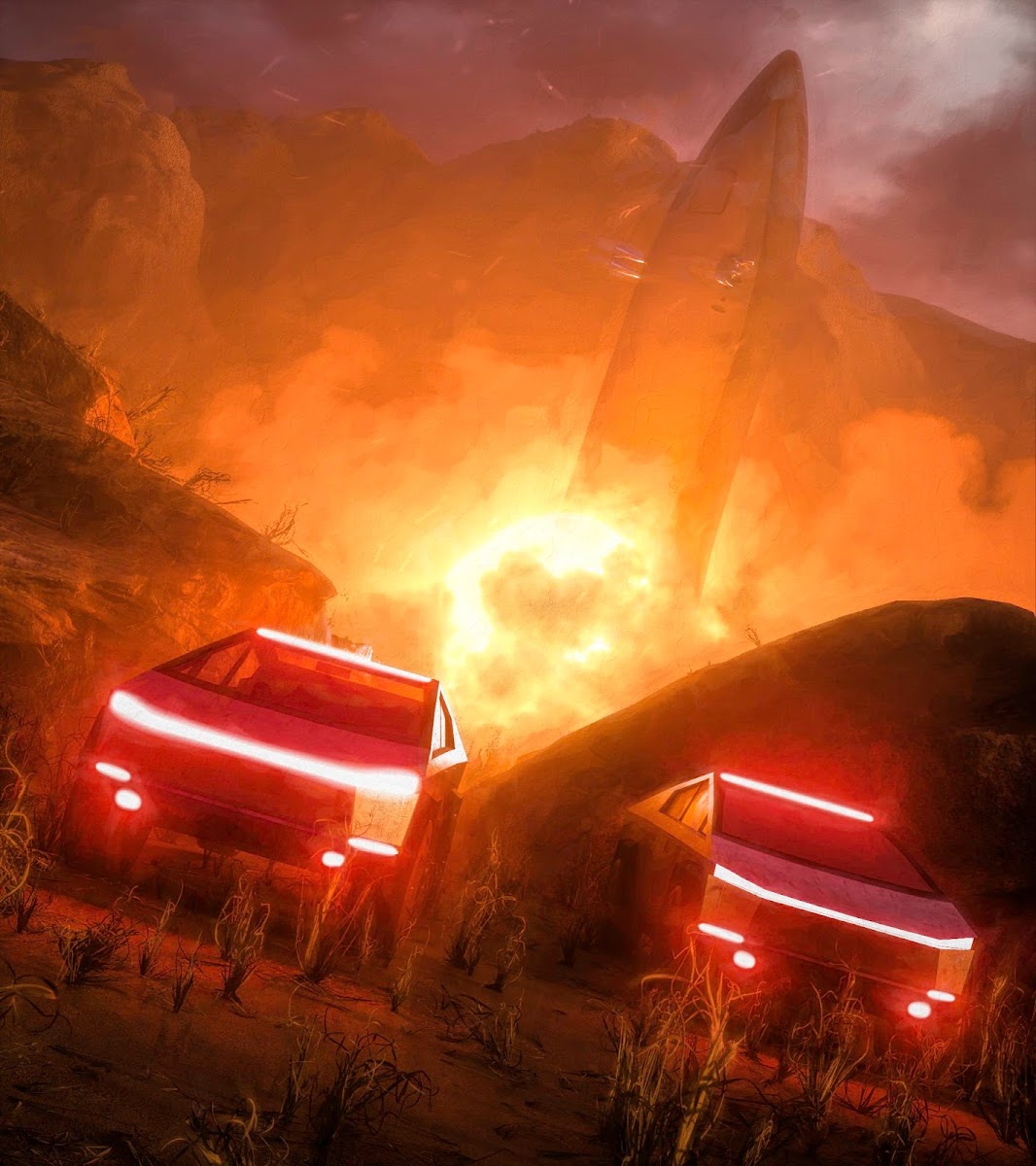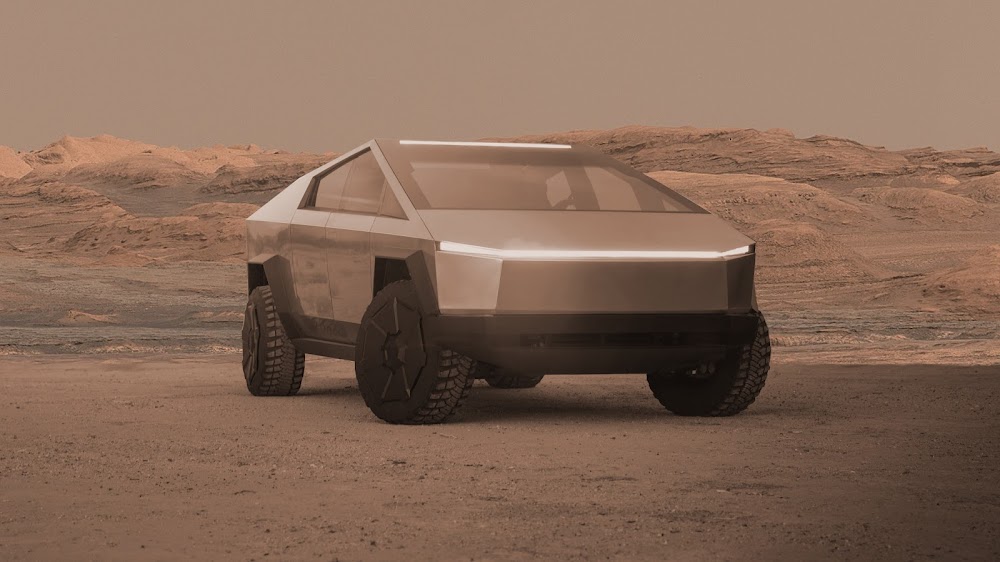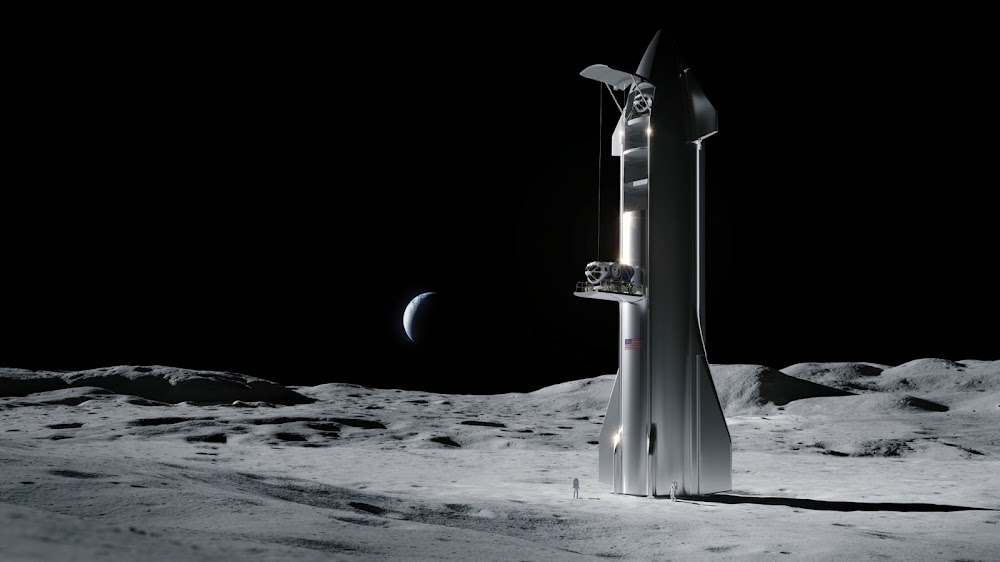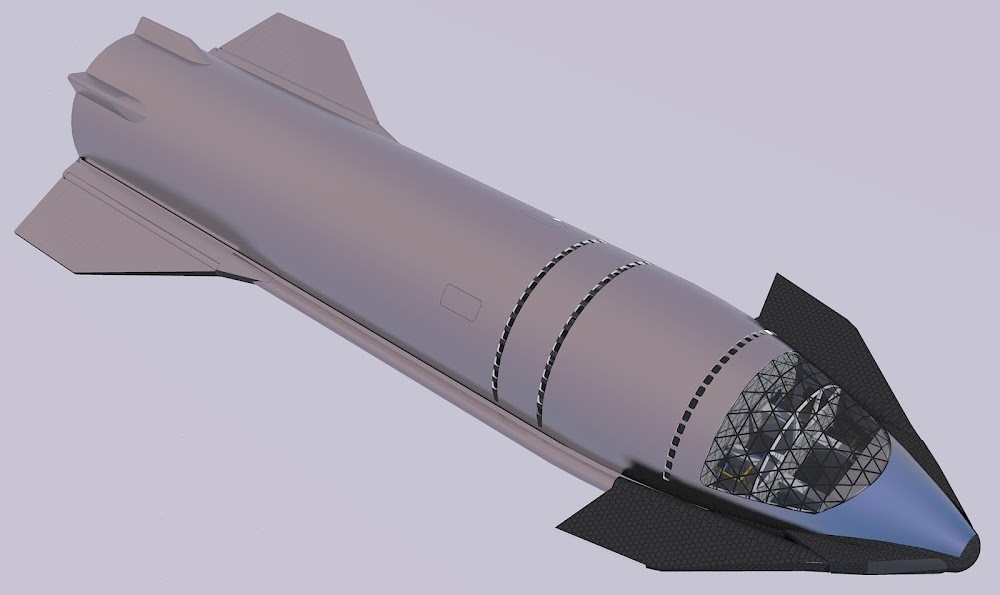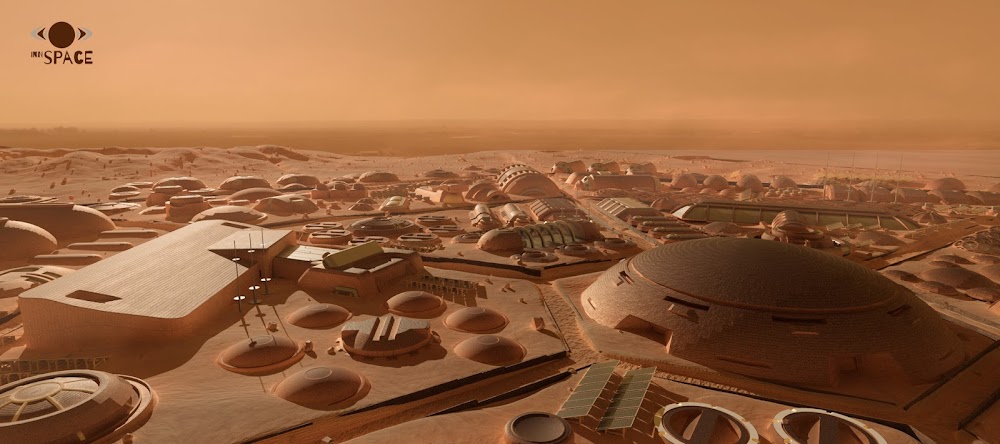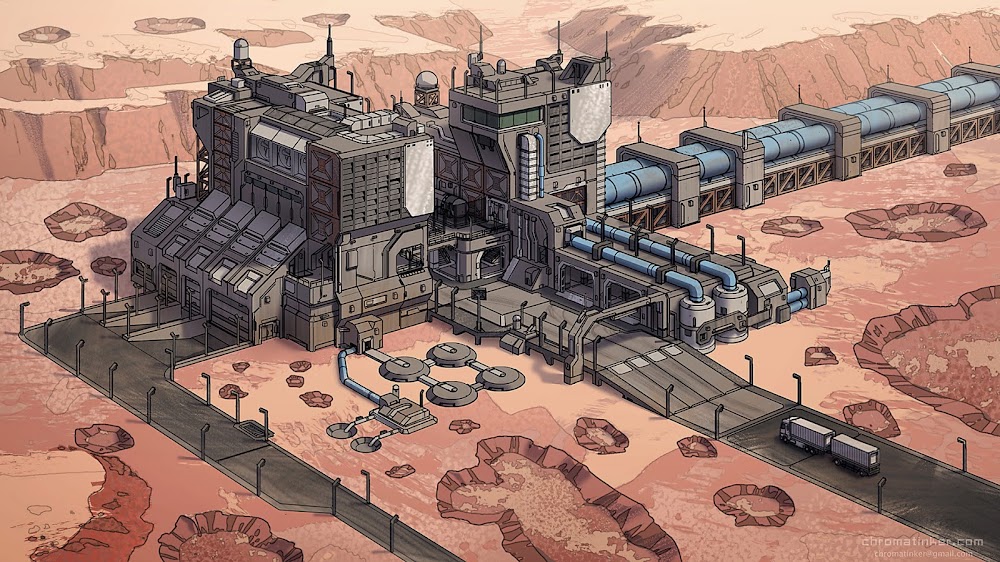A pair of Tesla Cybertrucks guarding SpaceX Starship launch by French YouTuber and visual effects artist ATOM (Eric Tualle). More of his art here.
Saturday, November 30, 2019
Friday, November 29, 2019
Poster of Tesla Cybertruck at Schiaparelli Crater on Mars
Poster of Tesla Cybertruck, pressurized edition, near a human base at Schiaparelli Crater on Mars by American video game concept artist Darren Bacon. More of his art here. Note a SpaceX cargo Starship (the 3-legged Tin Tin edition) on launch pad at the base.
Saturday, November 23, 2019
Starman resting at his Tesla Cybertruck on Mars by Eashan Misra
SpaceX's Starman resting at his Tesla Cybertruck on Mars by Indian space artist Eashan Misra. More of his art here. According to Elon Musk, the CEO of both Tesla and SpaceX, the pressurized edition of Cybertruck will be capable to drive on Mars.
Friday, November 22, 2019
Tesla Cybertruck on Mars
The pressurized edition of Tesla Cybertruck, unveiled yesterday by Elon Musk, will be capable operating on Mars. Reddit user u/redditbsbsbs has made an image:
Tuesday, November 19, 2019
HD quality official render of SpaceX cargo Starship unloading on the Moon
3 weeks ago SpaceX's Principal Mars Development Engineer Paul Wooster gave a presentation "SpaceX's Plans for Sending Humans to Mars" at 22nd Annual Mars Society Convention. In the presentation there was a new render of the redesigned SpaceX's cargo Starship unloading some NASA rovers on Lunar surface. Unfortunately no one was able to capture a decent quality image of the render then. Yesterday the render was posted on NASA's web page in high quality:
The post reveals that SpaceX is one of companies taking part in NASA’s Commercial Lunar Payload Services (CLPS) initiative which "allows rapid acquisition of lunar delivery services for payloads that advance capabilities for science, exploration, or commercial development of the Moon. Investigations and demonstrations launched on commercial Moon flights will help the agency study Earth’s nearest neighbor under the Artemis program. As its next step in exploration, NASA is preparing to send the first woman and next man to the Moon by 2024, establish sustainable lunar exploration by 2028, and plans to send astronauts to Mars in the mid-2030s."
The post reveals that SpaceX is one of companies taking part in NASA’s Commercial Lunar Payload Services (CLPS) initiative which "allows rapid acquisition of lunar delivery services for payloads that advance capabilities for science, exploration, or commercial development of the Moon. Investigations and demonstrations launched on commercial Moon flights will help the agency study Earth’s nearest neighbor under the Artemis program. As its next step in exploration, NASA is preparing to send the first woman and next man to the Moon by 2024, establish sustainable lunar exploration by 2028, and plans to send astronauts to Mars in the mid-2030s."
Tuesday, November 12, 2019
Underground Mars colony for 1000 people by InnSpace
A weak ago we posted a concept of Mars colony for 1000 people created by InnSpace team from Poland for Mars Colony Prize contest (held by The Mars Society). In some of the responses there was a critique stressing out the colony should be built underground for better radiation protection. Since then the authors of the concept sent us some additional renderings from which we can conclude it's actually the case - the concept includes most of the buildings being built underground (with only the transparent rooftops sticking out from regolith cover for natural lighting) and interconnected via underground passages.
A hyperloop line entering the colony:
Sunday, November 10, 2019
SpaceX Starship interior concept for 100 passengers
NASASpaceFlight.com forum members Ace (Rick Kiessig from New Zealand) and lamontagne (Canadian design engineer Michel Lamontagne) have created a concept for the interior layout of SpaceX's 100-passenger Starship (the passenger capacity goal stated by Elon Musk). Therefore this concept isn't meant for the first crew Starships on Mars used as temporary habitats for the first few years. For those first Starships Michel Lamontagne has created a separate concept.
The design divides the living space into 7 decks, labeled A to G, from the bottom-up. There are two openings between decks, offset slightly from one deck to the next, to reduce the risk of accidents related to trying to "fly" through multiple decks while in zero-G. There are removable rails around the openings, to prevent accidental falls while on Earth or Mars. All decks have a 2.2m high living space, except Deck G, which is 2.16m high. The blue bars in some areas are examples of hand and foot holds, like they use on International Space Station (ISS).
The floors are shown with hexagonal tiles, to indicate a system that will allow wall partitions and other items to be attached or removed to meet the tastes and needs of passengers.
Deck A has the gym, an external airlock, some storage space, and a couple of toilets:
The design divides the living space into 7 decks, labeled A to G, from the bottom-up. There are two openings between decks, offset slightly from one deck to the next, to reduce the risk of accidents related to trying to "fly" through multiple decks while in zero-G. There are removable rails around the openings, to prevent accidental falls while on Earth or Mars. All decks have a 2.2m high living space, except Deck G, which is 2.16m high. The blue bars in some areas are examples of hand and foot holds, like they use on International Space Station (ISS).
The floors are shown with hexagonal tiles, to indicate a system that will allow wall partitions and other items to be attached or removed to meet the tastes and needs of passengers.
Deck A has the gym, an external airlock, some storage space, and a couple of toilets:
- ISS found a need for 2+ hours of exercise per day to avoid bone and muscle loss. Multiplied by 100 people, that requires 10 exercise machines. Note that several of them are mounted on the walls.
- Making full use of walls and ceilings for living space is a theme of this design, since there's no "down" in zero-G.
- The airlock allows access to the outside of the ship during flight, in case of a need to make inspections or minor repairs, and to support landing in places without pre-existing ground infrastructure.
Tuesday, November 5, 2019
Mars colony for 1000 people by Innspace team (Mars Colony Prize contest)
This year The Mars Society held Mars Colony Prize - a contest for "the best plan for a Mars colony of 1000 people. The colony should be self-supporting to the maximum extent possible - i.e. relying on a minimum mass of imports from Earth. The goal is to have the colony be able to produce all the food, clothing, shelter, power, common consumer products, vehicles, and machines for 1000 people, with only the minimum number of key components, such as advanced electronics needing to be imported from Earth." According to speculations laid out in our Mars Colonization Timeline the first human base on Mars could reach a thousand inhabitants by late 2040s.
The winners of the contest were chosen at the International Mars Society convention in Los Angeles, California in October 2019. Here are images of the Ideacity concept by InnSpace team from Poland which got the 5th place:
The winners of the contest were chosen at the International Mars Society convention in Los Angeles, California in October 2019. Here are images of the Ideacity concept by InnSpace team from Poland which got the 5th place:
Central cluster of the colony:
Sunday, November 3, 2019
Factory on Mars by Adam Taylor
Picture of the Day 3/11/2019 - digital drawing of a factory on Mars by American concept artist Adam Taylor. More of his art here.
Saturday, November 2, 2019
SpaceX Starship interior concept by Jim Murphy
American aircraft interior designer Jim Murphy has made a concept for the interior of SpaceX's Starship with acceleration seats needed for takeoff and landing placed in individual cabins and acting as transformable beds. More of his designs here.
Starship's seats/cabins in launch, boarding & sleeping configuration:
Starship's seats/cabins in boarding configuration:
Starship's passenger seats/cabins:
More speculative internal layouts of Starship by SpaceX fans:
- Starship interior concept for 20 to 40 passengers by Paul King + VR tour
- Starship interior concept for 100 passengers by Joseph Lantz
- Animation of Starship interior concept by DeepSpaceCourier
- Cutaway schematic of Starship interior by Tom Dixon & Austin Barnard [not speculative]
- Starship interior concept for 64 passengers by Erik Corshammar & smallstars
- Cutaway diagram of Lunar Starship by Rocket Posters
- Starship interior concept for 100 passengers by Rick Kiessig & Michel Lamontagne
- Speculative internal structure of Starship by William Falconer-Beach
- Speculative internal layout of Starship by Michel Lamontagne
- Cutaway diagram of Starship by Julian Schindler
- Cutaway diagram of Big Falcon Ship by Nick Oberg
Subscribe to:
Posts (Atom)

